Why You Don’t Want to Store Onions with Potatoes
Melissa Hoeffner, food writer for Martha Stewart.com, explains that which produce items store well together (or not) is determined by which ones naturally create ethylene and which absorb this harmless-to-humans gas.
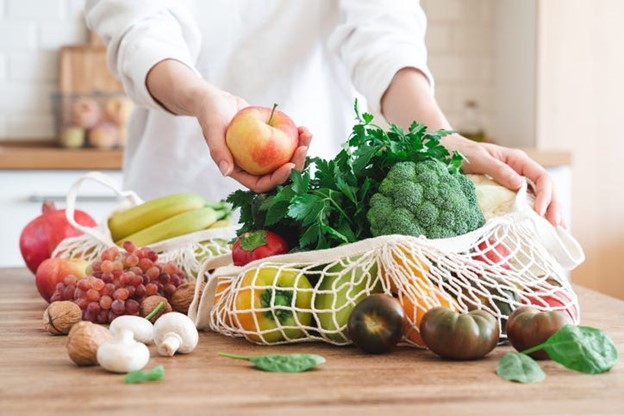
And knowing these workable and non-workable combinations when it comes to fruit and veggie storage is a simple way to reduce food waste and increase your produce’s longevity. Heeding Melissa’s tips will prevent your apples from smelling like onions, stop your fruits from ripening too quickly, and get rid of moisture that turns fresh lettuce to mush.
In general, don't store ethylene-sensitive fruits or vegetables with fruits or vegetables that produce a high amount of ethylene gasses. The best example of this is storing the above-mentioned onions with apples—you really will end up with onion-scented apples!
Also, avoid storing onions with potatoes. Storing onions and potatoes together hastens the ripening process on the potatoes, leading them to grow eyes and sometimes roots. This goes for garlic, as well. Keep it away from your potatoes.
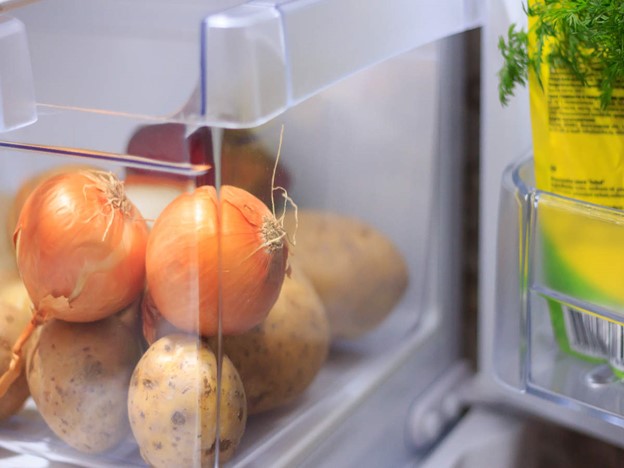
Moving on from onions and potatoes, let’s look at apples. Don't place them in a bowl with other fruits—they can be stored on the countertop, but because they emit lots of ethylene gas, aim to keep them at least 6 to 8 inches away from other fruits and vegetables. Consider putting a bowl of apples on a coffee table, hutch, or entryway station to keep your apples safely away from ethylene-sensitive produce.
There's one helpful exception to this: If you want to quickly ripen countertop fruits, like bananas, putting them closer to apples on the counter will help them ripen faster.
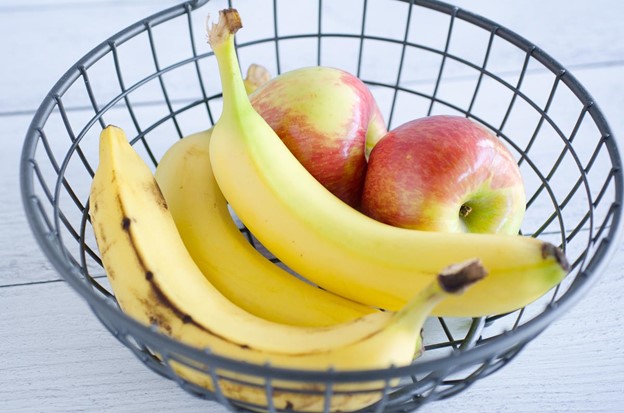
Like apples and bananas, melons produce ethylene. Melons are typically best stored on your countertop, until they are ripe enough to cut, eat, or store in sealed packages that will protect the fruit itself and its nearby neighbors in the fridge.
What about cauliflower? Like potatoes, cauliflower is very ethylene sensitive, so it is best not to store it in the same drawer as apples, melons, kiwis, or onions. It needs air circulation to stay fresh, so if it's in a punctured plastic bag, feel free to keep it in tact. If your cauliflower is in a plastic or compostable produce bag, make sure the top is open so it can breathe. It keeps best in a refrigerator drawer with other vegetables—or on a shelf. The same goes for broccoli, cabbage, and Brussels sprouts, all of which are also sensitive to ethylene.
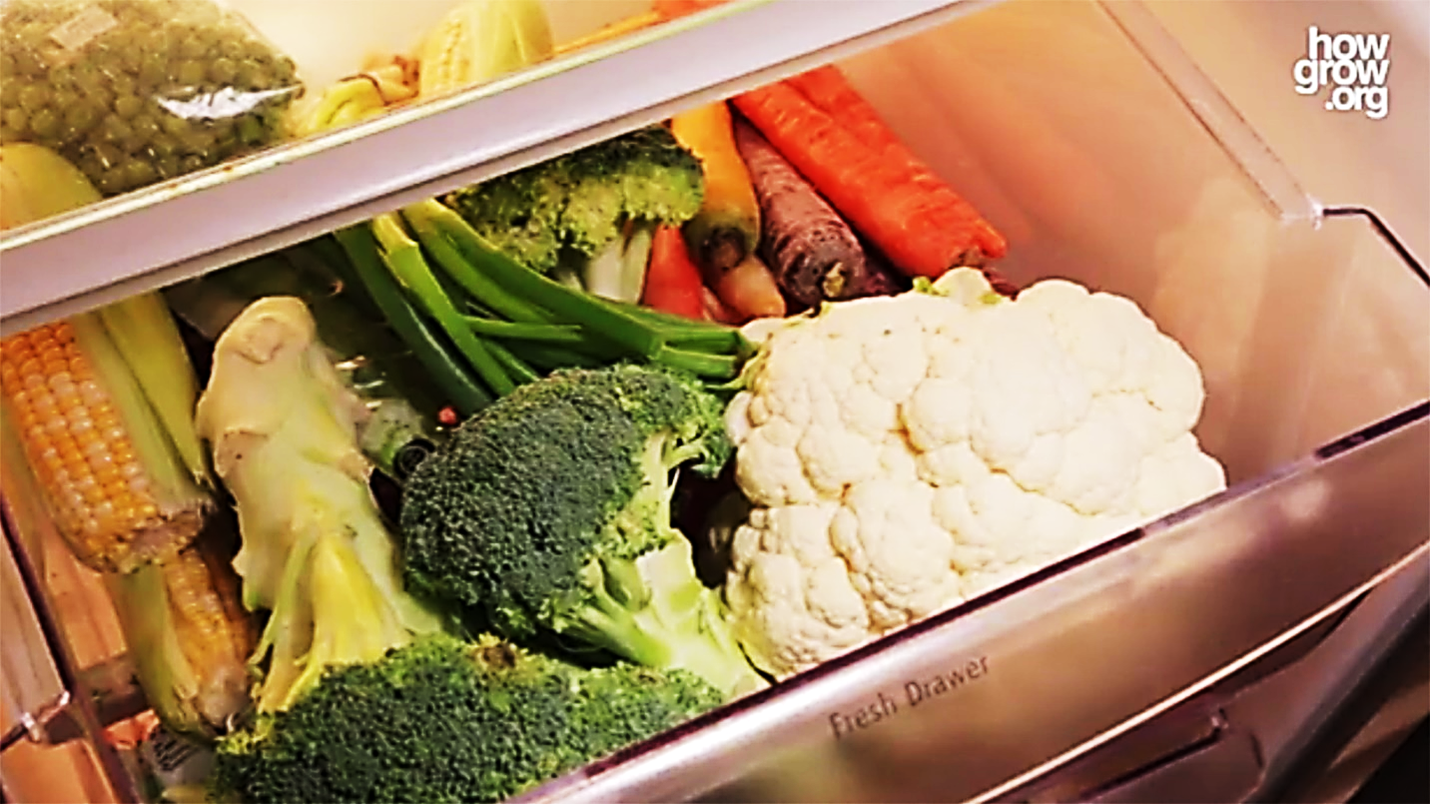
And mushrooms? While they’re technically a fungus—not a fruit or vegetable—we tend to think of them as produce, so we generally store them with other produce in the refrigerator. But don’t anymore. They easily absorb odors from strong-smelling foods nearby, so take care to store them near less pungent options.
Ultimately, it's best to store mushrooms in a paper bag; this lets them breathe and prevents contamination. The paper bag is also a moisture absorber, which protects the mushrooms from spoiling. If the bag feels wet or flimsy, change it out.
Lastly, there are some fruits that aren’t ethylene-sensitive. Citrus, for instance, can be stored with ethylene producers if your fridge space is tight. You’ll find that placing produce in storage containers will go a long way towards protecting them from ethylene gas damage.
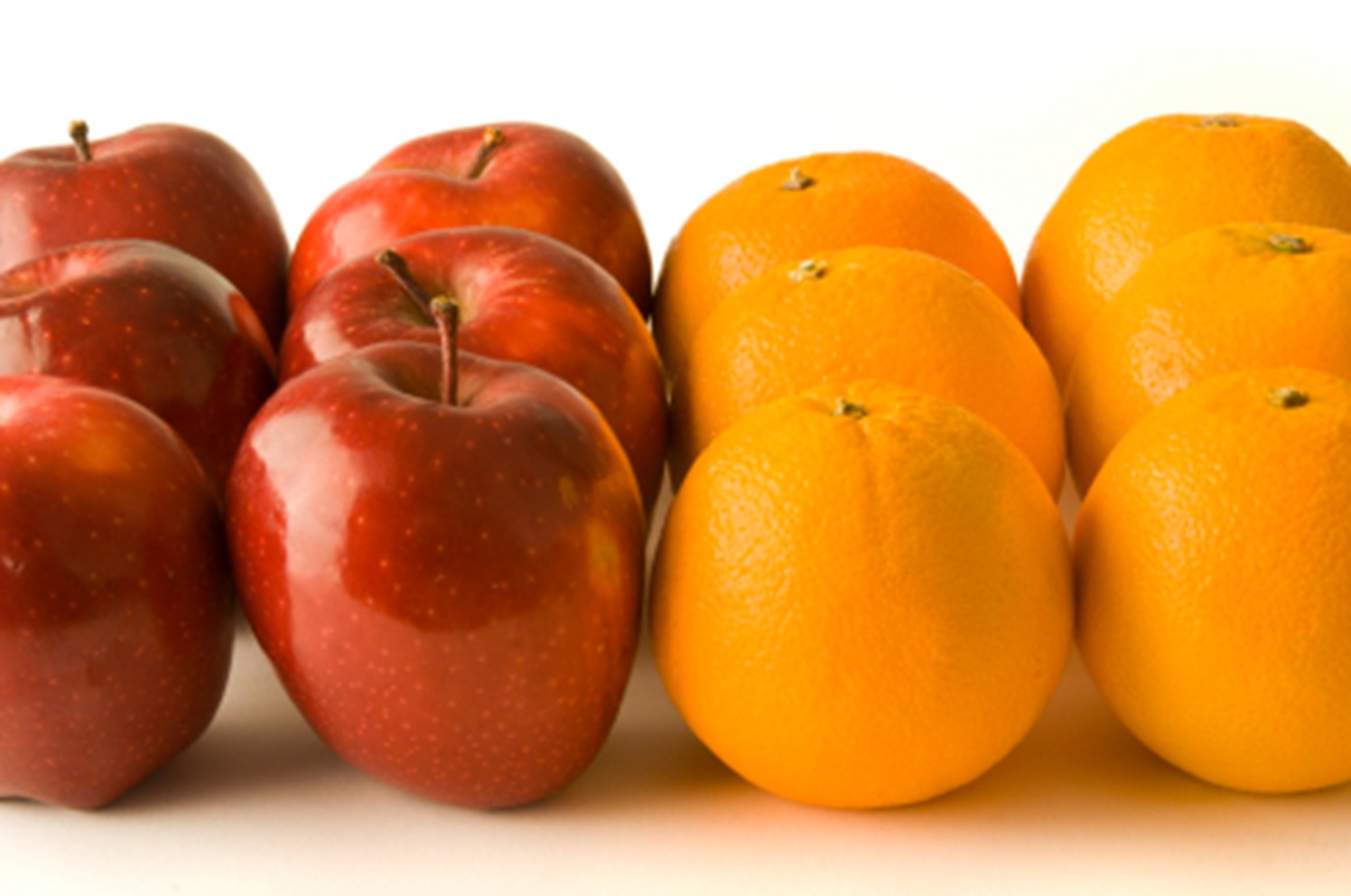
To sum up, the most important step to storing fruits and vegetables is to separate ethylene producers from their sensitive produce relatives. I’ll close with Melissa’s chart for a comprehensive list of produce items that should never be stored together:

And knowing these workable and non-workable combinations when it comes to fruit and veggie storage is a simple way to reduce food waste and increase your produce’s longevity. Heeding Melissa’s tips will prevent your apples from smelling like onions, stop your fruits from ripening too quickly, and get rid of moisture that turns fresh lettuce to mush.
In general, don't store ethylene-sensitive fruits or vegetables with fruits or vegetables that produce a high amount of ethylene gasses. The best example of this is storing the above-mentioned onions with apples—you really will end up with onion-scented apples!
Also, avoid storing onions with potatoes. Storing onions and potatoes together hastens the ripening process on the potatoes, leading them to grow eyes and sometimes roots. This goes for garlic, as well. Keep it away from your potatoes.

Moving on from onions and potatoes, let’s look at apples. Don't place them in a bowl with other fruits—they can be stored on the countertop, but because they emit lots of ethylene gas, aim to keep them at least 6 to 8 inches away from other fruits and vegetables. Consider putting a bowl of apples on a coffee table, hutch, or entryway station to keep your apples safely away from ethylene-sensitive produce.
There's one helpful exception to this: If you want to quickly ripen countertop fruits, like bananas, putting them closer to apples on the counter will help them ripen faster.

Like apples and bananas, melons produce ethylene. Melons are typically best stored on your countertop, until they are ripe enough to cut, eat, or store in sealed packages that will protect the fruit itself and its nearby neighbors in the fridge.
What about cauliflower? Like potatoes, cauliflower is very ethylene sensitive, so it is best not to store it in the same drawer as apples, melons, kiwis, or onions. It needs air circulation to stay fresh, so if it's in a punctured plastic bag, feel free to keep it in tact. If your cauliflower is in a plastic or compostable produce bag, make sure the top is open so it can breathe. It keeps best in a refrigerator drawer with other vegetables—or on a shelf. The same goes for broccoli, cabbage, and Brussels sprouts, all of which are also sensitive to ethylene.

And mushrooms? While they’re technically a fungus—not a fruit or vegetable—we tend to think of them as produce, so we generally store them with other produce in the refrigerator. But don’t anymore. They easily absorb odors from strong-smelling foods nearby, so take care to store them near less pungent options.
Ultimately, it's best to store mushrooms in a paper bag; this lets them breathe and prevents contamination. The paper bag is also a moisture absorber, which protects the mushrooms from spoiling. If the bag feels wet or flimsy, change it out.
Lastly, there are some fruits that aren’t ethylene-sensitive. Citrus, for instance, can be stored with ethylene producers if your fridge space is tight. You’ll find that placing produce in storage containers will go a long way towards protecting them from ethylene gas damage.

To sum up, the most important step to storing fruits and vegetables is to separate ethylene producers from their sensitive produce relatives. I’ll close with Melissa’s chart for a comprehensive list of produce items that should never be stored together:
| ETHYLENE PRODUCERS | ETHYLENE SENSITIVE |
|---|---|
| Avocados | Bananas (unripe) |
| Apples | Broccoli |
| Bananas (ripe) | Brussels sprouts |
| Figs | Cabbage |
| Grapes | Carrots |
| Melons | Cauliflower |
| Pears | Cucumbers |
| Peaches and Nectarines | Leafy Greens |
| Peppers | Lettuce |
| Onions | Potatoes |
| Tomatoes | Squash |
 Alice Osborne
Alice Osborne
Weekly Newsletter Contributor since 2006
Email the author! alice@dvo.com
